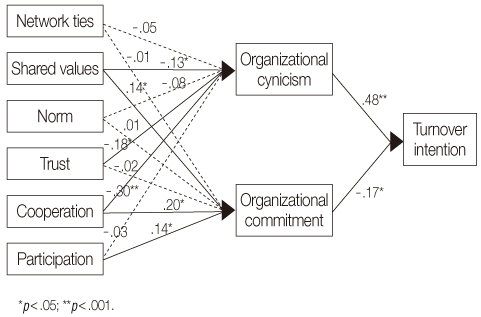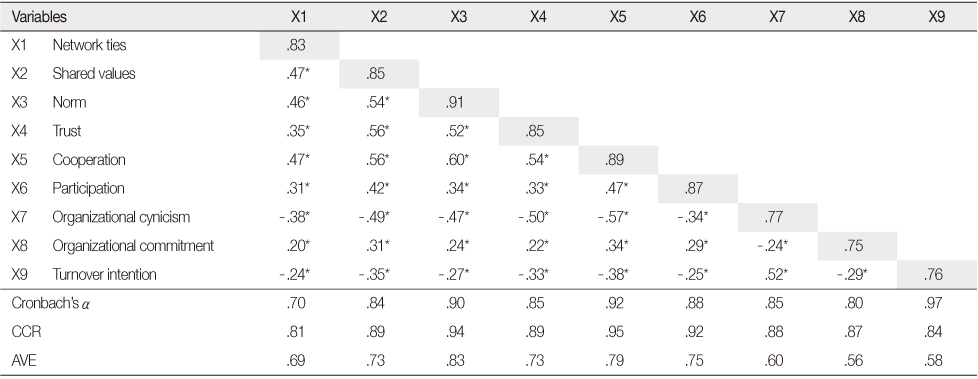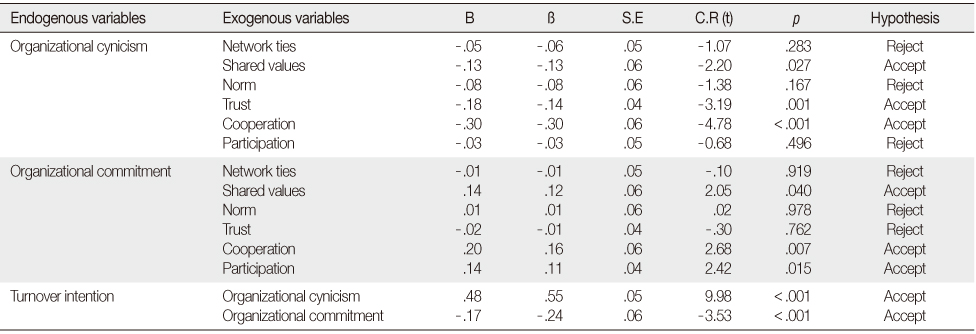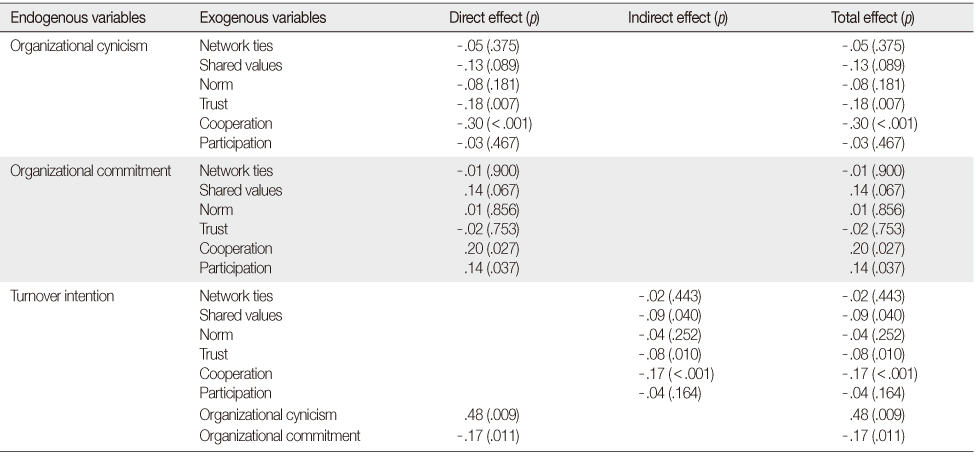Articles
- Page Path
- HOME > J Korean Acad Nurs > Volume 43(4); 2013 > Article
-
Original Article
- Effects of Nurses' Social Capital on Turnover Intention: Focused on the Mediating Effects Organizational Commitment and Organizational Cynicism
- Jeongwon Han, Heeyoung Woo, Eunsil Ju, Sohee Lim, Sangsook Han
-
Journal of Korean Academy of Nursing 2013;43(4):517-525.
DOI: https://doi.org/10.4040/jkan.2013.43.4.517
Published online: August 30, 2013
1College of Nursing Science, Kyung Hee University, Seoul, Korea.
2College of Nursing Science, East-West Nursing Research Institute, Kyung Hee University, Seoul, Korea.
- Address reprint requests to: Han, Sangsook. College of Nursing Science, Kyung Hee University, 1 Hoegi-dong, Dongdaemun-gu, Seoul 130-701, Korea. Tel: +82-2-961-9427, Fax: +82-2-961-9398, sshan12@khu.ac.kr
© 2013 Korean Society of Nursing Science
Abstract
-
Purpose
- The purpose of this study was to investigate the casual relationship between nurses' social capital and turnover intention and to verify the goodness of fit between a hypothetical model and actual data in order to suggest the best model.
-
Methods
- This survey was conducted with 315 nurses working in general hospitals in Seoul. Data were collected from December 1 to December 30, 2011, and analyzed using SPSS Windows 18.0 and AMOS 16.0.
-
Results
- Nurses' social capital was found to have a direct effect on reducting organization cynicism and increasing organizational commitment. Nurses' organizational cynicism and organizational commitment were found to have a direct effect on turnover intention, but social capital did not have a direct effect on turnover intention. However, social capital had a partial and indirect effect on turnover intention through mediating organizational cynicism and organizational commitment.
-
Conclusion
- Results of this study indicate that nurse managers should put increased effort in reducing nurses' organizational cynicism and improving their organizational commitment, two contrary parameters. At the same time managers need to develop plans to establish social capital more efficiently so that nurses have lower turnover intention.
- 1. An YS. Effects of the nurses' role stress on turnover intentions: Organizational commitment and burnout as intermediate. Seoul, Kyung Hee University. 2012;Unpublished master' s thesis.
- 2. Atwater LE, Waldman DA, Atwater D, Cartier P. An upward feedback field experiment: Supervisors' cynicism, reactions, and commitment to subordinates. Pers Psychol. 2000;53(2):275–297. http://dx.doi.org/10.1111/j.1744-6570.2000.tb00202.xArticle
- 3. Bateman TS, Organ DW. Job satisfaction and good soldier: The relationship between affect and employee "citizenship". Acad Manage J. 1983;26(4):587–595. http://dx.doi.org/10.2307/255908
- 4. Burke RJ, Moodie S, Dolan SL, Fiksenbaum L. Job demands, social support, work satisfaction and psychological well-being among nurses in Spain. ESADE Bus Sch Res Pap. 2012;233:3–31. http://dx.doi.org/10.2139/ssrn.2117051Article
- 5. Chang PK, Ahn DH, Go SY. The effect of F&B employees' social capital on the knowledge management and job satisfaction, organizational commitment in the hotel industry. J Tourism Sci. 2012;36(1):307–330.
- 6. Choi SY. A study on the effect of organizational cynicism and affective commitment on the organizational citizenship behavior of social workers. J Korean Soc Welf Adm. 2005;7(2):1–31.
- 7. Chun KK. A study on the effects of the organizational injustice on the negative behaviors of employees: Focusing on mediating effects of the trust them. Seoul, Kyung Hee University. 2011;Unpublished master's thesis.
- 8. Chung HS, Ha HK, Park DG. The influence of organizational silence on turnover intention: Mediated moderating effect of self-efficacy through organizational cynicism. Korean J Ind Organ Psychol. 2010;23(1):89–104.Article
- 9. Coleman JS. Social capital in the creation of human capital. AJS. 1988;94:Suppl. S95–S120.Article
- 10. Dean JW, Brandes P, Dharwadkar R. Organizational cynicism. Acad Manage Rev. 1998;23(2):341–352.Article
- 11. Furukawa MF, Raghu TS, Shao BB. Electronic medical records, nurse staffing, and nurse-sensitive patient outcomes: Evidence from the national database of nursing quality indicators. Med Care Res Rev. 2011;68(3):311–331. http://dx.doi.org/10.1177/1077558710384877ArticlePubMedPDF
- 12. Han KJ, Woo SK. A study on the effects of hotel operation employee's social capital on the trust and cynicism, turnover intention. J Tourism Leis Res. 2012;24(1):347–369.
- 13. Hong JY, Kim OH, Lee EK. The relationship among nurse-doctor collaboration, job autonomy and organizational commitment. J Korean Acad Nurs Adm. 2009;15(4):601–609.
- 14. Jang KS, Kim EA, Oh SH. Effects of social capital on organizational performance in hospital organization: Focusing on effects of intellectual capital. J Korean Acad Nurs Adm. 2011;17(1):22–32. http://dx.doi.org/10.11111/jkana.2011.17.1.22Article
- 15. Jeon WB, Moon SJ. A study on antecedents of hotel employees' perception of career plateau, organizational commitment and turnover intention. Korean J Tourism Res. 2008;22(4):43–67.
- 16. Jeong JH, Kim JS, Kim KH. The risk factors influencing turnover intention of nurses. J Korean Acad Nurs Adm. 2008;14(1):35–44.
- 17. Kim IS. The role of self-efficacy and social support in the relationship between emotional labor and burn out, turn over intention among hospital nurses. J Korean Acad Nurs Adm. 2009;15(4):515–526.
- 18. Kim WB, Rhee KY. Trust as social capital and organizational commitment. Korean J Sociol. 2002;36(3):1–23.
- 19. Kim YS. Influences of job stress and burnout on turnover intention of nurses. Seoul, Kyung Hee University. 2011;Unpublished master's thesis.
- 20. Leana CR, Van Buren HJ. Organizational social capital and employment practices. Acad Manage Rev. 1999;24(3):538–555.Article
- 21. Lee SG, Yoon YS. A study on the relationship between social capital and organizational performance in hospitality organizations. Korean J Tourism Res. 2011;26(3):311–337.
- 22. Lee YC. Social capital, knowledge management, and organizational performance. J Inf Syst. 2007;16(4):223–241.
- 23. Mobley WH. Employee turnover: Causes, consequences and control. Reading, MA: Addison-Wesley; 1982.
- 24. Moon SJ, Han SS. A predictive model on turnover intention of nurses in Korea. J Korean Acad Nurs. 2011;41(5):633–641. http://dx.doi.org/10.4040/jkan.2011.41.5.633ArticlePubMed
- 25. Mowday RT, Steers RM, Porter LW. The measurement of organizational commitment. J Vocat Behav. 1979;14(2):224–247.Article
- 26. Nahapiet J, Ghoshal S. Social capital, intellectual capital, and the organizational advantage. Acad Manage Rev. 1998;23(2):242–266.Article
- 27. Needleman J, Buerhaus P, Pankratz VS, Leibson CL, Stevens SR, Harris M. Nurse staffing and inpatient hospital mortality. N Engl J Med. 2011;364(11):1037–1045. http://dx.doi.org/10.1056/NEJMsa1001025ArticlePubMed
- 28. Park HB, Kang JS, Kim SM. The creation of social capital and intellectual capital, and their effects on organizational performance management. Korea Public Adm J. 2003;12(1):3–35.
- 29. Park KO, Kim JK, Kim SY, Chang S. A model on turnover intention of chief nurse officers. J Korean Acad Nurs. 2012;42(1):9–18. http://dx.doi.org/10.4040/jkan.2012.42.1.9ArticlePubMed
- 30. Tett RP, Meyer JP. Job satisfaction, organizational commitment, turnover intention, and turnover: Path analyses based on meta-analytic findings. Pers Psychol. 1993;46(2):259–293.Article
REFERENCES
Figure & Data
REFERENCES
Citations

- The Roles of Relational Leadership and Employee Satisfaction in the Linkage Between Social Capital and Employee Turnover: A Moderated‐Mediation Analysis
James Aditchere, R. Angmortey
Journal of Public Affairs.2025;[Epub] CrossRef - The Price of silence, isolation, and cynicism: The impact on occupational frustration
Omar Durrah, Wafa Rashid Alalyani, Kamaal Allil, Ayman Al Shehab, Shooq Al Rawas, Ali Hubais, Souzan Hannawi
Heliyon.2023; 9(11): e22278. CrossRef - Duygusal Emeğin İşten Ayrılma Niyetine Etkisinde Örgütsel Bağlılığın Aracılık Rolü: Yiyecek İçecek İşletmeleri Üzerinde Bir Araştırma
Mehmet POLAT
GSI Journals Serie A: Advancements in Tourism Recreation and Sports Sciences.2022; 5(2): 145. CrossRef - The Association Between Unit-Level Workplace Social Capital and Intention to Leave Among Employees in Health Care Settings: A Cross-Sectional Multilevel Study
Mako Iida, Kazuhiro Watanabe, Emiko Ando, Kanami Tsuno, Akiomi Inoue, Sumiko Kurioka, Norito Kawakami
Journal of Occupational & Environmental Medicine.2020; 62(5): e186. CrossRef - Positive Psychological Capital Mediates the Association between Burnout and Nursing Performance Outcomes among Hospital Nurses
Minjeong An, Eun Suk Shin, Myoung Yi Choi, Yeonhu Lee, Yoon Young Hwang, Miran Kim
International Journal of Environmental Research and Public Health.2020; 17(16): 5988. CrossRef - Paternalistic Leadership, Organizational Cynicism, and Intention to Quit One’s Job in Nursing
Cuma Sungur, Özlem Özer, Meltem Saygili, Özgür Uğurluoğlu
Hospital Topics.2019; 97(4): 139. CrossRef - Occupational therapy practitioners’ ratings of job satisfaction factors through a lens of social capital
Vicki C. Mason, Mary L. Hennigan
Occupational Therapy In Health Care.2019; 33(1): 88. CrossRef - Effects of Underemployment Perception of Chinese Hotel Employees on Turnover Intention and Organizational Cynicism
우양, 김영현
Tourism Research.2018; 43(3): 141. CrossRef - The Quintessence of Organizational Commitment and Organizational Cynicism
Aida Margelytė-Pleskienė, Jolita Vveinhardt
Management of Organizations: Systematic Research.2018; 80(1): 67. CrossRef - Mediating Effect of Organizational Commitment in the Relationship between Job Satisfaction and Turnover Intention for Staff Nurses Working with Alternative Shift System in the Medical-Surgical Units
cho hang nan, Song, Chi Eun, 박애란
Global Health and Nursing (글로벌 건강과 간호).2018; 8(1): 1. CrossRef - RETRACTED: The Mediating Effect of Social Capital on the Relationship Between Public Health Managers' Transformational Leadership and Public Health Nurses' Organizational Empowerment in Korea Public Health
Soo Young Jun
Asian Nursing Research.2017; 11(4): 246. CrossRef - Influence of type D personality on job stress and job satisfaction in clinical nurses: the mediating effects of compassion fatigue, burnout, and compassion satisfaction
Yeon Hee Kim, Sung Reul Kim, Yeo Ok Kim, Ji Young Kim, Hyun Kyung Kim, Hye Young Kim
Journal of Advanced Nursing.2017; 73(4): 905. CrossRef - Effects of Nurses' Social Capital and Job Engagement on Nursing Performance: Focused on the Mediating effects of Organizational Citizenship Behavior
Mi Soon Ko, Hyunsook Zin Lee, Myung Suk Koh
Journal of Korean Academy of Nursing Administration.2017; 23(1): 42. CrossRef - Mediating Effect of Social capital between Transformational leadership and Organizational Commitment of Nurses in Hospitals
Soon-gu Kim, Young-sook Seo
Journal of the Korea Academia-Industrial cooperation Society.2016; 17(2): 282. CrossRef - Validity and Reliability of a Korean version of Leader Rapport Management
Jeong-Won Han, Nam-Eun Kim
Journal of the Korea Academia-Industrial cooperation Society.2016; 17(2): 129. CrossRef - The effect of social capital on job satisfaction and quality of care among hospital nurses in South Korea
Ji In Shin, Eunjoo Lee
Journal of Nursing Management.2016; 24(7): 934. CrossRef - A Study on the Relationship Between Schools’ Health and Teachers’ Organizational Commitment
Ali Asghar Hayat, Naeimeh Kohoulat, Javad Kojuri, Hatam Faraji
International Journal of School Health.2015;[Epub] CrossRef - Introducing Routine Measurement of Healthcare Worker's Well-being as a Leading Indicator for Proactive Safety Management Systems Based on Resilience Engineering
Bobbie N. Ray-Sannerud, Stephen Leyshon, Vibeke B. Vallevik
Procedia Manufacturing.2015; 3: 319. CrossRef - Literature Review of Structural Equation Models for Hospital Nurses' Turnover Intention in Korea
Eunhye Kim, Jinhyun Kim
Perspectives in Nursing Science.2014; 11(2): 109. CrossRef - Effects of Decision Making Competency, Nursing Professionalism, and Job Satisfaction on Turnover Impulse among Nurses
Heun Keung Yoon, Jihea Choi, Eun-young Lee, Haeyoung Lee, Mijeong Park
Journal of Korean Academy of Nursing Administration.2013; 19(5): 658. CrossRef

Figure 1
The Correlation and Discriminant Validity of the Model
*p<.001; The shaded section: Discriminant validity, The non shaded section: Correlation.
CCR=Composite construct reliability; AVE=Average variance extracted.
Result of the Fit Statistics of the Measurement Model
GFI=Goodness of fit index; AGFI=Adjusted goodness of fit index; NFI=Normed fit index; CFI=Comparative fit index; RMR=Root mean residual; RMSEA=Root mean squared error of approximation.
The Result of Path Coefficient
B=Regression weight; β=Standardized regression weight; S.E.=Standard error; C.R.=Critical ratio.
The Effects of Predictor Variables in the Model
* CCR=Composite construct reliability; AVE=Average variance extracted.
GFI=Goodness of fit index; AGFI=Adjusted goodness of fit index; NFI=Normed fit index; CFI=Comparative fit index; RMR=Root mean residual; RMSEA=Root mean squared error of approximation.
B=Regression weight; β=Standardized regression weight; S.E.=Standard error; C.R.=Critical ratio.
 KSNS
KSNS
 E-SUBMISSION
E-SUBMISSION





 Cite
Cite

